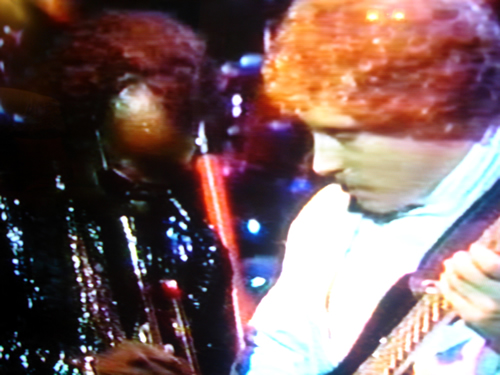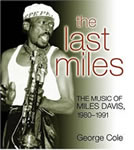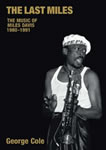The second in a series of reports on Miles’s live gigs from 1981-1991 that I attended or have seen on video.
Venue: Wembley Conference Centre, London
Date: 16th November 1986
This was the fourth time I saw Miles (the 1984 and 1985 gigs will be covered later) and it was unusual in a number of respects. First, Miles’s last two gigs had been in July at the London Jazz Festival, held at the Queen Elizabeth Hall in South London. But this one was at the Wembley Conference Centre; a place I didn’t know existed before this concert, although I had been to the Wembley Arena a few times. Miles had also expanded his band, with a second keyboardist (Adam Holzman) joining Robert Irving III. The other band members were Bob Berg (sax), Vince Wilburn Jr (dr), Steve Thornton (per) and Darryl Jones (b). Jones had been in the band the last couple of times I’d seen Miles, but had actually left Miles’s band for over a year in July 1985 to join Sting’s band. His replacements had been Angus Thomas and Felton Crews, neither of which played in the UK with Miles. Jones rejoined Miles’s band in October 1986. John Scofield, who had played guitar in all the previous Miles gigs I’d attended (the first one with Mike Stern) had gone and in his place was Garth Webber, who was completely unknown to me.

Miles with Garth Webber
Webber had in fact followed Mike Stern and Robben Ford and by the time he played in London, had been with Miles a couple of months. Webber has been criticised in some quarters as not fitting in with the band, but I disagree. He played really well and in fact, played the most solos and often for long stretches – a sure sign that Miles liked your playing. As usual, the concert opened up with a loud and frenetic version of “One Phone Call/Street Scenes”, which saw both Berg and Webber play long solos. Miles was in good form and he played long, powerful stretches of horn during the next tune, “New Blues.” Once again, Webber played a long blues solo that brought cheers from the crowd. The next track was “Perfect Way” and Darryl Jones played a strong groove on this one. It was interesting to note how Jones’s role had changed since his comeback. He still played strongly and powerfully, but whereas in 1984 and (to a lesser extent 1985) he played several solos (often using pedal effects) he was much more in the background on this gig. That said, there were lots of smiles between him and Miles. Berg has grown a lot in the two years he had been with Miles and was super-comfortable on-stage, occasionally playing keyboards.
One of my favourite tunes was “Human Nature” and this was the period when the coda consisted of a guitar solo. Webber really let rip, beginning with some “spacey” sound effects before finishing with off a powerful solo that ended with a trumpet blast from Miles. The tune then segued into “Wrinkle,” where an animated Webber played some funky rhythm guitar and Wilburn some heavy backbeat. I recall Miles spending a lot of time staring at Wilburn and making hand gestures. As the Tutu album had just been released, it’s no surprise that tunes from the album dominated the set (“Tutu,” “Splatch,” “Tomaas,” “Perfect Way” “Full Nelson” and “Portia”) and they were much looser than the album versions. Webber again shone on “Splatch” and on “Don’t Stop Me Now.” On “Carnival Time,” Steve Thornton played a fast and furious conga solo. The heaviest number of the night was an old tune (it was recorded during The Man With The Horn sessions), “Burn” which had Berg blowing hard on tenor sax and Webber soloing again. Miles played two encores, “Maze” which was propelled by Darryl Jones’s powerful bass riff before finishing with “Portia.” I always loved the way Miles played this tune on-stage. The band would play and Miles would blow a little and then leave, with the rest of the band playing on the bandstand. Then some most members would play solos and in fact, this was the first time Holzman and Irving stood out. Jones played a solo too and eventually Irving was left on the stage. He hit a button on his keyboard and created a sound loop, which continued playing after he had left the stage.
This was a time of some upheaval for Miles and his band. By the end of the year, Webber and Thornton would leave, and by early 1987, Berg and Wilburn had left. By the time Miles returned to the UK in summer 1987, only Miles, Jones, Irving and Holzman would still be in the band and Miles had overhauled both the set and the song arrangements.
If you have any memories of Miles’s gigs from 1981-1991, why don’t you tell us about it?! All reports will be put online for other Miles fans to share. Email

